Wuhu, located in the eastern part of China, offers a beautiful blend of natural landscapes, rich history, and modern attractions. This bustling city is one of the most important urban centers in Anhui Province, boasting unique cultural and historical significance. Whether you’re traveling for leisure or business, Wuhu has something for every type of traveler. In this guide, we will cover essential travel details, top attractions, the best accommodation options, and insider tips to help you make the most of your visit.
🌍 General Information about Wuhu
| Feature | Details |
|---|---|
| Official Language | Mandarin |
| Population | Approx. 3.5 million |
| Area | 3,157 km² |
| Country | China |
| Continent | Asia |
| Local Time | GMT +8 |
| Currency | Chinese Yuan (CNY) |
| Plug Type | Type A, C, and I |
| Average Annual Temperature | 15.4°C (59.7°F) |
| Climate | Humid subtropical, with hot summers and mild winters |
| Flora | Predominantly temperate zone with a mix of deciduous trees and bamboo |
| Main Economy | Manufacturing, agriculture, and transportation |
| Country Code | +86 |
| City Phone Code | 0553 |
🏙️ Top Tourist Attractions in Wuhu
- Wuhu Yangtze River Bridge: One of the largest bridges in the region, offering picturesque views of the Yangtze River. It’s a perfect spot for photography and sightseeing.
- Fanchang Lake Scenic Area: A beautiful natural area with a mix of serene lakes, lush greenery, and temples. Ideal for nature lovers and those seeking tranquility.
- Zheshan Mountain: Known for its stunning panoramic views and historic pagoda, Zheshan is a must-visit for history and nature enthusiasts.
- Wuhu Ocean Park: A family-friendly destination, featuring marine life exhibits, rides, and performances.
🚗 How to Get to Wuhu
By Air: The nearest airport is Wuhu Xuanzhou Airport, approximately 50 km from the city center. It connects to major cities like Beijing, Shanghai, and Guangzhou.
By Train: Wuhu is well-connected by rail to major cities in China. The Wuhu Railway Station is a major stop on the Shanghai-Hefei-Wuhan line.
By Bus: Numerous long-distance buses connect Wuhu to nearby cities and regions.
By Car: Wuhu is located about 130 km from Nanjing, and about 380 km from Shanghai. Driving to Wuhu offers flexibility to explore nearby attractions.
🚆 Best Transportation Tips
- Public Transport: The Wuhu Metro is a convenient way to navigate the city. Taxis and buses are also widely available.
- Bike Rentals: A great option for exploring the city at your own pace, especially around the Yangtze River area.
- Walking: Wuhu is a compact city, so walking is often the best way to explore local neighborhoods and markets.
🏨 Accommodation in Wuhu
Budget Hotels
- Wuhu Golden Rooster Hotel: Starting at $30 per night. Simple, clean, and affordable.
- GreenTree Inn Wuhu Railway Station: Starting at $25 per night. Basic amenities with easy access to transport hubs.
Luxury Hotels
- Shangri-La Hotel Wuhu: Starting at $150 per night. This five-star hotel offers luxury rooms, stunning river views, and excellent facilities.
- Wuhu Marriott Hotel: Starting at $130 per night. A comfortable and elegant hotel with top-tier service and amenities.
🍜 Food Recommendations
- Wuhu Style Fish Soup: A delicacy made from fresh river fish, often served with noodles.
- Steamed Dumplings: Wuhu offers various fillings, including pork, shrimp, and vegetables.
- Luzhou Roast Duck: A popular dish in the region with crispy skin and tender meat.
- Fried Shrimp with Garlic: A savory, garlicky dish that is popular in coastal regions.
☕ Best Cafés and Restaurants
- Cafe & Bar 20°: A chic café offering a variety of coffee, desserts, and light meals, ideal for relaxing after a day of sightseeing.
- Dongguan Restaurant: Known for its traditional Chinese dishes and beautiful river views.
- Wuhu Restaurant: A perfect place to sample local dishes in a cozy setting.
🏰 History of Wuhu
Wuhu has a long and rich history dating back over 2,000 years. The city was once a major trading hub along the Yangtze River and was known for its flourishing port during the Tang Dynasty. Over time, Wuhu grew into a vital industrial city, playing an important role in the development of modern China. Today, its history is reflected in the many ancient buildings and landmarks scattered throughout the city.
🌍 Geographical Features of Wuhu
- Yangtze River: The city is located along this mighty river, which is the longest in Asia and the third longest in the world.
- Zheshan Mountain: Offering great hiking opportunities, this mountain is famous for its scenic views and historic pagodas.
- Fanchang Lake: A beautiful body of water surrounded by lush forests and hills.
🌟 Famous Residents
- Liang Qichao: A famous scholar and reformer who was born in Wuhu during the Qing Dynasty.
- Yuan Longping: Known as the “Father of Hybrid Rice,” Yuan’s groundbreaking work has had a profound impact on global agriculture.
🌍 Neighboring Cities and Countries
- Nanjing: Located approximately 130 km from Wuhu, Nanjing is a cultural and historical powerhouse.
- Hefei: The capital of Anhui Province, about 100 km to the west of Wuhu.
- Shanghai: 380 km to the east, offering an international hub of commerce, culture, and tourism.
💡 Insider Tips
- Visit During the Spring Festival: The city’s lantern festivals and traditional Chinese New Year celebrations are a major highlight.
- Explore Local Markets: Wuhu’s local markets, such as Wuhu Old Street, are perfect for souvenir hunting and sampling authentic local food.
🤔 Frequently Asked Questions (FAQs)
- What is the best time to visit Wuhu? The best time to visit is during spring (March to May) or autumn (September to November) when the weather is mild and pleasant.
- How do I get around in Wuhu? You can use the metro, taxis, or rental bikes. Walking around the city is also quite convenient.
- What is the local currency in Wuhu? The local currency is the Chinese Yuan (CNY).
- Is Wuhu safe for tourists? Yes, Wuhu is generally considered safe for tourists, with low crime rates and friendly locals.
- Can I use English in Wuhu? While major tourist sites may have some English signage, it’s recommended to learn a few basic Mandarin phrases or use a translation app.
🏞️ Wuhu’s Rich History
Wuhu, an ancient city with a history stretching over 2,000 years, has played an important role in China’s development. During the Tang Dynasty, it was an essential trading port along the Yangtze River, facilitating the exchange of goods between northern and southern China. Over time, it evolved into an industrial center, contributing significantly to the modern economy of Anhui Province. The city’s rich heritage can be seen in its temples, ancient architecture, and historical landmarks that dot the landscape.
🏙️ Districts, Neighborhoods, and Villages in Wuhu
Wuhu is divided into several key districts, each with its own unique characteristics:
- Jiujiang District: This district is known for its historical significance and is home to the ancient Wuhu Yangtze River Bridge. It’s a blend of old and new, with modern shops sitting next to traditional street markets.
- Fanchang District: Known for its natural beauty and serene lakes, Fanchang is the perfect escape from the bustling city life.
- Wuhu County: A mix of rural and urban environments, Wuhu County is where you can experience traditional Chinese village life.
- Yijiang District: The commercial heart of Wuhu, where you’ll find a variety of shopping centers, restaurants, and entertainment venues.
⛰️ Geographical Features of Wuhu
Wuhu’s geographical features make it a unique destination for nature lovers and those looking to experience China’s diverse landscapes. The city is situated on the banks of the Yangtze River, the longest river in Asia and the third-longest in the world. This proximity to the river has shaped the city’s culture and economy for centuries. Additionally, Wuhu is surrounded by hills and mountains, offering plenty of opportunities for outdoor activities such as hiking and sightseeing.
- Yangtze River: A defining feature of Wuhu, the river not only offers stunning views but also opportunities for river cruises and fishing.
- Zheshan Mountain: With its winding paths and ancient temples, this mountain is a fantastic destination for hiking and photography.
- Fanchang Lake: Known for its clear waters and scenic surroundings, this lake provides a peaceful environment for visitors to relax and enjoy nature.
🌍 Neighboring Cities and Countries
Wuhu is strategically located, making it an excellent base for exploring the surrounding regions. Neighboring cities offer a variety of cultural, historical, and modern attractions.
- Nanjing: Approximately 130 km away, Nanjing is the capital of Jiangsu Province and a city with rich historical landmarks, including the Nanjing Yangtze River Bridge and the Sun Yat-sen Mausoleum.
- Hefei: Located about 100 km from Wuhu, Hefei is the capital of Anhui Province. It is a vibrant city that blends modernity with tradition, offering both cultural and natural attractions.
- Shanghai: Around 380 km to the east, Shanghai is a global metropolis known for its skyline, shopping, and cultural experiences.
🌟 Famous Residents of Wuhu
Wuhu has been the birthplace or home to several notable figures who have had a lasting impact on China’s history and culture. Among these individuals are:
- Liang Qichao: A famous intellectual and reformist who played a significant role in the modernization of China in the late Qing Dynasty.
- Yuan Longping: The “Father of Hybrid Rice,” Yuan’s work revolutionized agriculture in China and across the globe. His contribution helped millions of people gain access to affordable food.
- Wang Xizhi: One of China’s most revered calligraphers, he was born in Wuhu during the Eastern Jin Dynasty.
💡 Insider Tips for Visiting Wuhu
- Learn Basic Mandarin: While many in Wuhu can speak Mandarin, knowing a few phrases can enhance your experience, especially in local markets and smaller districts.
- Visit Local Markets: Wuhu’s local markets are perfect for picking up souvenirs such as traditional handicrafts, teas, and snacks. The Wuhu Old Street is particularly famous for its lively atmosphere and traditional goods.
- Timing Your Visit: The best time to visit Wuhu is in the spring or autumn when the weather is mild and perfect for outdoor activities. Avoid the peak summer months when it can get hot and humid.
- Take a Boat Ride: Don’t miss out on a scenic boat ride along the Yangtze River. It’s one of the best ways to experience the beauty of Wuhu from a different perspective.
🤔 Frequently Asked Questions (FAQs) – Continued
- What is the best way to explore Wuhu’s local culture? Exploring Wuhu’s local culture is best done on foot or by bike. Take time to wander around the local markets, interact with locals, and visit cultural sites such as the Wuhu Yangtze River Bridge.
- Are there any cultural festivals in Wuhu? Yes, Wuhu hosts several cultural festivals throughout the year, such as the Lantern Festival and the Spring Festival (Chinese New Year), which are fantastic opportunities to experience traditional Chinese customs.
- Can I easily find vegetarian food in Wuhu? While Chinese cuisine features a variety of meat dishes, vegetarian options are also widely available in restaurants. You can easily find tofu, vegetable dumplings, and vegetable-based stir-fried dishes.
- What are some safety tips for visiting Wuhu? Wuhu is generally safe for tourists. However, it’s always wise to keep an eye on your belongings, especially in crowded places. It’s also important to be aware of your surroundings when walking at night.
- Are there any day trips from Wuhu worth taking? Yes! You can take a day trip to nearby Nanjing, Hefei, or explore the natural beauty of Mount Jiuhua, a famous Buddhist mountain in Anhui Province.

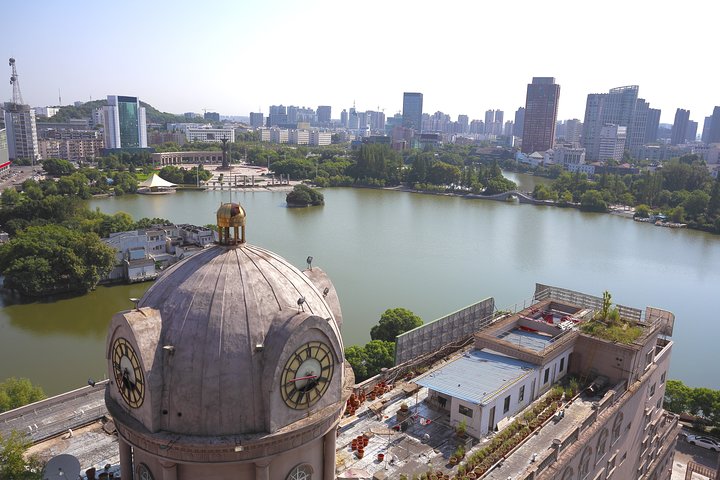
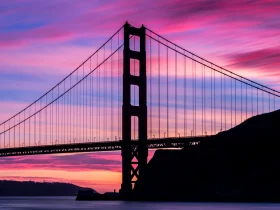

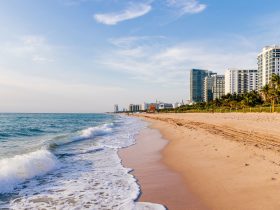
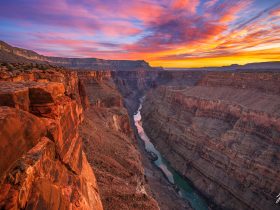
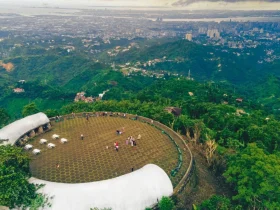
Leave a Review